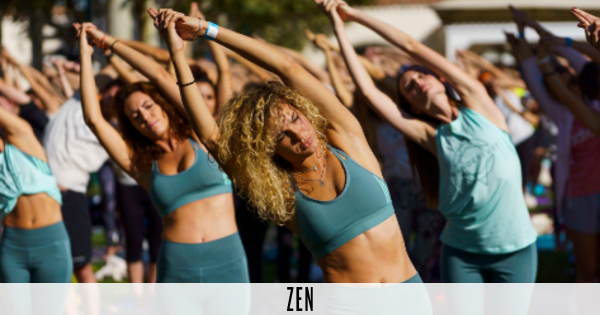- Yoga to calm the nervous system and refresh the body
- The 98-year-old Forrest Gump yogi sweeps the USA
- Who is the mysterious blonde yogi who poses naked all over the world?
They were doomed to understand each other. Each one from his 'corner', 'runners' and yogis were observed with some distrust. "That is too lazy for me! I need something to put the batteries and cause me to kick out endorphins," some exclaimed. "The 'high' is very good, but what about the force, the mobility, the flexibility and the search for serenity that denies us today?", Argued the others. Traditionally, mutual misunderstanding has marked the relationship between the 'fans' of the absolute king of aerobic exercise and the ancient discipline that matches body and mind .
However, more and more runners have found in yoga a perfect complement to their jogging (a trip that, it must be said, does not have so many passengers in reverse). It is the most Zen version of that holy water that relieves the overload of your muscles and joints.
Well, now there is another reason to equate the power of asanas with that of the race. Because if, for decades, scientists have highlighted the ability of aerobic exercise to strengthen the brain and contribute to the growth of new neurons, few studies had examined how yoga affects the brain. Few ... so far.
According to research conducted by experts from the Department of Kinesiology at the University of Illinois and the Institute of Gerontology at Wayne State University (United States), yoga improves many of the same brain structures and functions that are enhanced with aerobic routines .
In the report, published on November 5 in the journal Brain Plasticity, it is explained how through their practice, 'rookie' yogis got an activation of certain parts of the brain, such as the hippocampus, located in the limbic system. Closely involved in memory processing, this structure is the first one that is affected in dementia and Alzheimer's.
LIFE CHANGE
Seventh in the list of fitness trends 2019 prepared by the American College of Sports Medicine, yoga has long since ceased to be a minority discipline. "I do not think this is a 'boom'. Different modalities have emerged that adapt to the whole world and it is no longer the yoga that many people saw as 'more sectarian or perroflauta'. Therefore, many have given it the opportunity , they have tried it and their existence has changed. This is a way of life that has nothing to do with other 'fitness' fashions, "explains the Spanish yogi Lucía Liencres.
See this post on Instagram
Ambassador of Wanderlast 108, the largest global wellness event that took place last September 29 in Barcelona and October 5 in Madrid (with La Roca Village and Las Rozas Village as 'partners' and sponsors of the relaxing space 'The Experience Spot' ), Liencres discovered yoga in 2012. "I felt very stiff and stressed. I went to a class with my great-aunt and, when I saw her doing the pine and the flexibility I had, I was amazed. Since then, I'm hooked." .
The yogi does not understand how, at this point, there are still those who think that yoga is a 'lazy' thing: "It is quite the opposite and I think, therefore, many people do not want to try. It is not so easy to face all your weaknesses, both physical and mental. " Science, once again, proves it right.
According to the criteria of The Trust Project
Know more- Alzheimer's
- Barcelona
- U.S
- Madrid
- Yoga
InnovationThe Spanish scaleups ecosystem in 2018 ranks fifth in Europe
Events Dismantling a 'Breaking bad' type laboratory in Vallecas
EmpresasGrifols: The purebred Ibex that triumphs against Alzheimer's

